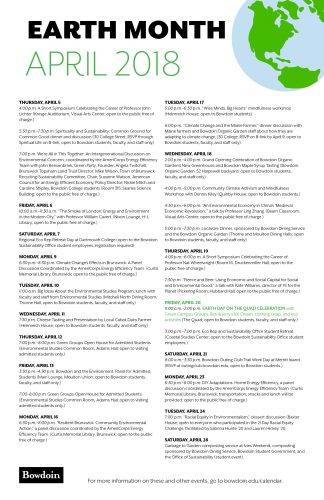Spirituality, Sustainability, and the Sisters of Mercy
By Carly Berlin '18It’s not often that nuns visit Bowdoin. Last week, however, Mary Pendergrast and Chris Loughlin, a pair of activism-orientated nuns, met with students for the first event in a new series, Spirituality and Sustainability: Exploring Common Ground for the Common Good.

It’s not often that nuns visit Bowdoin. Last week, however, Mary Pendergrast and Chris Ploughing, a pair of activism-orientated nuns, met with students for the first event in a new series, Spirituality and Sustainability: Exploring Common Ground for the Common Good. Joined by professor Greg Teegarden of St. Joseph’s College, discussion over dinner ranged from the politics of fracking to the shifting cosmology of our time.
The first Spirituality and Sustainability event is part of a long list of programs this month celebrating Earth Month.
The Spirituality and Sustainability series is being offered by the Office of Religious and Spiritual Life, and the Office of Sustainability. Director of Religious and Spiritual Life Eduardo Pazos Palma said he hopes the series will draw students of faith into conversations about the environment, while also bringing those interested in studying the natural world into an exchange about religion and academia. “We want to learn to speak to bigger, greater common knowledge,” Palma said. “We want to bring rabbis and imams to campus, as well as those who work on kibbutzim, at monasteries and in eco-communes.”
 Keisha Payson, Bowdoin’s sustainability director, spoke of dimension that spirituality brings to a science-grounded discussion about the environment. “We may look at the scientific evidence and see that something is wrong—such as water pollution or climate change—but how we each react to the data might come from a more spiritual place, and a commitment to the common good.”
Keisha Payson, Bowdoin’s sustainability director, spoke of dimension that spirituality brings to a science-grounded discussion about the environment. “We may look at the scientific evidence and see that something is wrong—such as water pollution or climate change—but how we each react to the data might come from a more spiritual place, and a commitment to the common good.”
The visiting nuns spoke directly to the intersection of spirituality and sustainability. The two are members of the Sisters of Mercy of the Americas, an international community of Roman Catholic women devoted to five “Critical Concerns: Earth, immigration, nonviolence, anti-racism, and women.” Ploughing, a Dominican nun from Massachusetts, said, “We hope to awaken an intimacy with all forms of life and become of service to the commons.”
Pendergrast, who is the ecology director of her branch of Sisters of Mercy in Rhode Island, told students that “our lands are our legacy.” She described her arrest in 2015 for attempting to plant tulips on Spectra Energy property in Burillville, R.I., as part of a protest against the company’s plans to expand pipelines and build a power plant.
Professor Teegarden—who taught at Bowdoin in the early aughts—is current chair of the Sciences Department at St. Joseph’s college in Standish, Maine. Teegarden teaches a course mandatory for all students called Ecology and the Environmental Challenge, which looks at scientific issues in an interdisciplinary manner. Teegarden, himself a Catholic, spoke of the way he reconciles his faith and his study. “In science, there are no miracles,” he said. “Scientists base our knowledge on reproducibility and observation. But, we are human beings.”
Students dove into the conversation, too. One student spoke of her first-year roommates’ surprise at finding out that she studies science while being a practicing Christian. “I believe in evolution and God,” she said. Mariama Sowe ’18, a neuroscience major and president of the Muslim Students Association, spoke of the excitement she feels upon learning a new scientific principle. “I always say, ‘God is cool!’”
Ploughing gestured around her at all enjoying an evening of Indian food and robust discussion. “We are all cosmic pilgrims at this table,” she said.